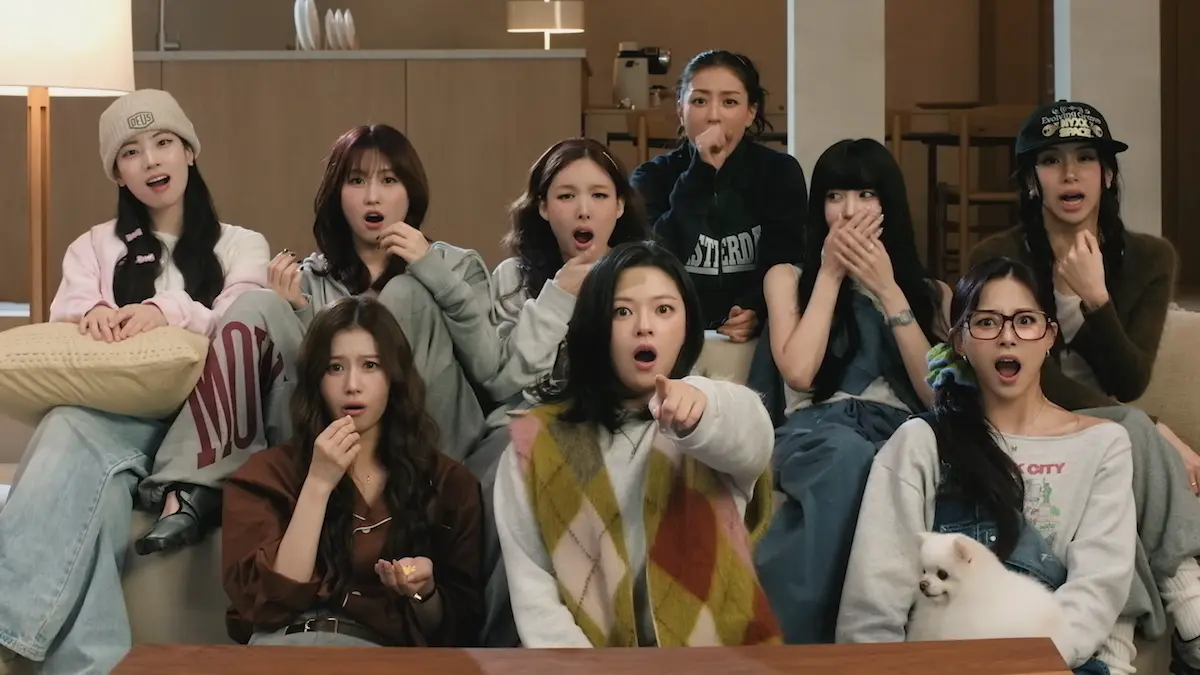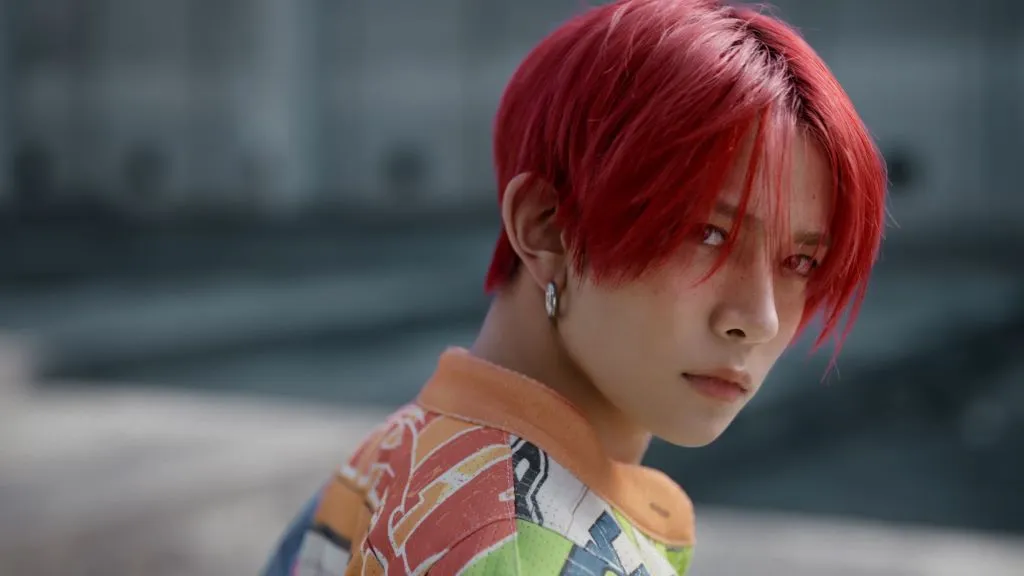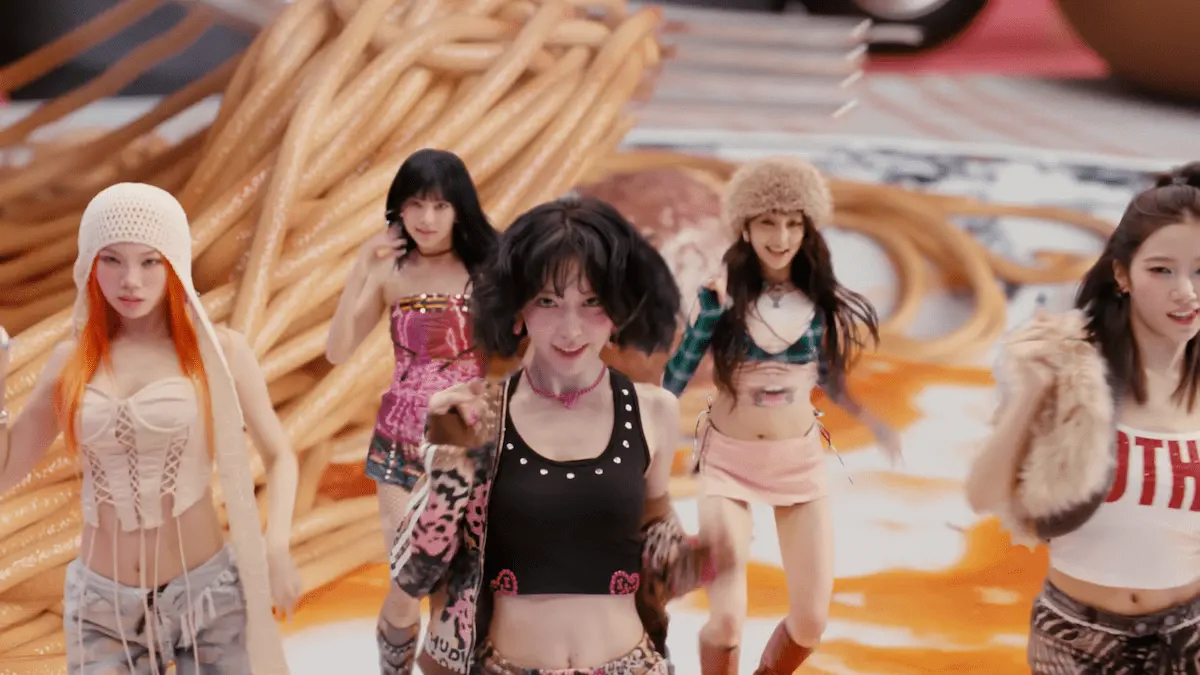TWICE's 'ME+YOU' Explained: Ten Years, Nine Hearts, Still Beating as One
I’ve followed TWICE since debut, and I’m not going to lie—this one made me tear up. Not because it’s sad, but because after ten years of predictions about their “inevitable” end, here they are: nine women who chose each other, wrote a song about it, and created something that feels like flipping through a decade of memories with your best friends.
ME+YOU isn’t trying to be the biggest comeback or the catchiest hook. It’s quieter than that, more personal. And maybe that’s exactly what a 10th anniversary should be.

Source: Official JYP Entertainment YouTube (© JYP Entertainment)
Table of Contents
Quick Facts & Credits
What matters: The members contributed ideas to the lyrics themselves. KENZIE—one of K-pop’s most respected producers—shaped the sound. This wasn’t just handed to them. They built it.
What the MV Is Really Showing You
The Chaotic Home (0:00-0:30): A Glimpse into Their Real Life
The video opens not with a polished, perfect image, but with the nine members in a state of lively chaos. They are in a living room full of boxes, seemingly cleaning up or moving in together. They play pranks, get in each other’s way, and share moments of playful annoyance. It feels less like a music video set and more like a real window into their dorm life. This isn’t staged comfort; it’s the beautiful, noisy mess created by a decade-long family. This scene powerfully establishes that their bond is real, not just for the cameras.
The Divining Rod Scene (0:14): Searching for What’s Already There
Amidst the opening chaos, there’s a brief but deliberate shot of members using divining rods at (0:14). In Korean culture, 수맥 찾기 (finding water veins) represents searching for something essential and life-giving. The symbolism is ironic and witty: they pretend to search for a treasure, but the real treasure is the very group of people creating chaos in that room. It’s TWICE’s unique humor, acknowledging they found what’s precious ten years ago.
The “Like OOH-AHH” Recreation (1:47): The Moment That Broke Me
At (1:47), they’re back in that abandoned building from their debut. Same costumes. Same location. Same choreography. Except now they’re not rookies—they’re veterans recreating the moment that started everything.
A comment I kept seeing in multiple languages: “Seeing them do the same dance in the same place after 10 years… I can’t stop crying.” That’s the power of this visual choice. It’s not about showing how much they’ve changed. It’s about showing they’re still them.
The Surprise Cameo: Um Tae-goo as The Observer (2:58)
Just when you think the video is purely a look inward, there’s a brief, powerful cameo by actor 엄태구 (Um Tae-goo). Known for his incredibly intense screen presence and distinctive voice in films like “밀정 (The Age of Shadows)” and “낙원의 밤 (Night in Paradise),” his appearance here is unexpected and brilliant.
At (2:58), we see him as a neighbor, looking slightly weary, walking up to the door, presumably to complain about the noise. But he stops. Through the door, he sees the members—not being loud, but sharing a quiet, genuine moment. He doesn’t knock. Instead, a faint, knowing smile forms on his face, and he simply walks away.
What it means: This isn’t a comedic punchline. Um Tae-goo represents the outside world—the public, the critics, perhaps even the skeptics who watched them for ten years. His character comes expecting noise and idol theatrics but finds something real instead: family. His silent, respectful retreat is a powerful symbol of acknowledgment. It’s the world looking in and finally understanding that the bond TWICE shares is authentic.
The Individual Moments That Matter
Each member gets personal moments throughout—not about hierarchy or screen time, but about presence. Jihyo’s soft smile at (2:24). Tzuyu’s quiet confidence. These aren’t posed shots. They’re women who’ve earned the right to just exist in their own power.
The Lyrics: What They’re Actually Saying
“No-one knows me / Like you do, honestly / Better than I know myself”
This is the emotional core. After ten years of living, performing, and growing up together—they know each other in ways no one else can. Not family. Not management. Not even us.
In Korean, there’s a phrase 속마음을 아는 사이 (the relationship where you know each other’s inner hearts). That’s what they’re describing. The bond that comes from truly seeing someone, not just their public face.
“All I need is you / Just you”
In a world that constantly tells them they need more—more success, more views, more everything—they’re saying: actually, we need each other. That’s enough.
The repetition isn’t accidental. It’s emphasis. After a decade of industry pressure, contract negotiations, and endless speculation about their future—this is their answer.
“I’ll stick by your side like glue / It’s true / Nothing’s ever gonna come between us”
“Like glue” is almost childish in its simplicity, and I think that’s intentional. It’s the kind of promise you make when you’re young and don’t know how hard keeping it will be. Except they’ve already kept it for ten years. So now it’s not naive—it’s proven.
“Nothing’s ever gonna come between us / Ain’t no way / We can’t lose” reads like a direct response to everyone who predicted their disbandment. They’re saying: you were wrong. We’re still here.
“Always Me + You”: The Title That Says Everything
In Korean, it’s written as 미 플러스 유 (Me Plus You), but the brilliance is in the ambiguity. “Me + You” means:
- The members to each other
- The group to their fans (ONCE)
- Individual identity plus collective identity
That dual meaning is what makes the song so powerful. It’s both a declaration between nine people and a love letter to everyone who’s been on this journey.
The Korean Context You’re Missing
십년지기 (Sipnyeonjigi): The 10-Year Friend
In Korean culture, a friend you’ve known for ten years has a specific term: 십년지기. It’s not just about duration—it’s a cultural milestone that signifies a bond deep enough to be considered family.
Most K-pop groups don’t make it to seven years. Making it to ten with all nine members? That’s nearly unprecedented for girl groups. Korean comments kept repeating 9명 그대로 (all nine, unchanged), and that’s the miracle they’re celebrating.
The Living Room as 집 (Home)
That opening scene of chaotic cleaning is peak 집 culture. It’s not just a house; it’s a home filled with the history of their dorm life, which has always been part of TWICE’s narrative.
Many groups stop living together after initial contracts. TWICE maintaining that domestic intimacy is a statement. They’re not coworkers. They’re family.
정 (Jeong): The Unspoken Bond
There’s a Korean concept that doesn’t translate cleanly: 정 (jeong). It’s a deep emotional connection that develops through shared experiences over time. Deeper than friendship, more nuanced than love. It’s the bond that forms when you’ve weathered life together.
That’s what “So many dreams we’ve been chasing together / We’ve been through the tears and the laughter” is invoking. Not just memories—jeong.
Why It Sounds Like This
R&B Over Bright Pop: A Deliberate Shift
TWICE built their brand on instant earworms. “Cheer Up,” “TT,” “Likey”—songs designed to grab you immediately. ME+YOU going R&B instead is a statement.
R&B in K-pop signals maturity, sophistication, emotional depth. By choosing this genre for their 10th anniversary, they’re saying: we’ve grown up. We’re not the same girls who debuted at 16-20 years old. And that’s okay.
The groove is relaxed. The tempo is moderate. There’s space for vocals to breathe. This isn’t about hitting you over the head with a hook—it’s inviting you into an intimate moment.
KENZIE’s Signature Touch
KENZIE’s involvement brings a specific sonic identity—polished, vocally-focused, emphasizing harmony. The pre-chorus vocal layering at (0:42) is pure KENZIE: multiple voices creating a wall of sound that feels rich without being overwhelming.
That Bridge at 2:18
The production strips down to almost nothing—just vocals and minimal backing. At (2:18), the line “All I know, it just gets better with time” is delivered with zero vocal processing, maximum sincerity.
Bridges are make-or-break moments. This one works because it doesn’t try to be the climax. It’s the breath before the final chorus, the moment of honesty before the grand statement. Pure distilled vulnerability.
What Fans Are Feeling
I spent hours reading comments across Korean, Japanese, and English. The recurring theme wasn’t about the music specifically—it was about staying. About not giving up. About choosing each other when they didn’t have to.
Fans who were teenagers when TWICE debuted are now in their twenties and thirties. They grew up alongside this group. Watching nine women honor their shared history while looking confidently toward the future—that hits different when you’ve been on the journey with them.
One sentiment kept appearing in different languages: “Thank you for being nine.” Not for the music, not for the performances. Just for staying together. In an industry built on planned obsolescence, that’s everything.
Why This Actually Matters
ME+YOU is proof that the K-pop system doesn’t have to eat you alive. Girl groups are expected to have short lifespans before being replaced by the next generation. TWICE making it to ten years with all nine members, still releasing quality music, still genuinely liking each other—that’s quietly revolutionary.
They’re also navigating something we don’t talk about enough: aging in an industry obsessed with youth. Nayeon is 30. Jeongyeon is 29. In K-pop girl group years, that’s ancient. ME+YOU doesn’t try to make them look younger. The styling is elegant, age-appropriate, confident. The concept isn’t about being the cutest—it’s about being women who’ve grown into themselves.
That representation matters. For fans who grew up with them. For younger groups watching and realizing maybe there’s a path beyond seven years. For everyone who was told they had an expiration date.
If you’re looking for a blueprint of sustainability in K-pop, here it is: maintain genuine relationships, evolve without abandoning your identity, value the group over individual ambition, and build reciprocal trust with your audience.
ME+YOU is the mission statement of that blueprint. It’s them saying: this worked. We’re still here. And we’re not done yet.
Sources & Credits
Primary Source:
Song Credits:
- Composers: Daniel ‘Obi’ Klein, KENZIE, Charli Taft
- Lyricists: TWICE (members contributed), Charli Taft, KENZIE, Daniel ‘Obi’ Klein
- Arrangement: Daniel ‘Obi’ Klein
- Genre: R&B Pop, Urban Pop
Album Context:
- TEN: The Story Goes On (Special 10th Anniversary Album)
- 10 tracks total (title track + 9 solo songs, one per member)
- Continues narrative from debut album “THE STORY BEGINS” (2015)
- Released October 10, 2025 (10 days before official anniversary)
MV References:
- “What is Love” (2018) - TV watching scene
- “Knock Knock” (2017) - Door opening scene
- “Like OOH-AHH” (2015) - Bus scene recreation with original costumes/location




Comments